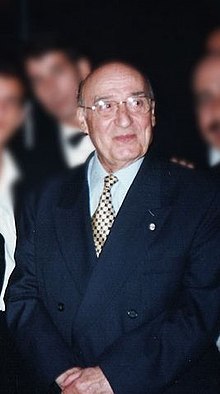| Wadih El Safiوديع الصافي | |
|---|---|
 | |
| Background information | |
| Birth name | Wadih Bishara Yousef Francis وديع بشارة يوسف فرنسيس |
| Also known as | Sawt Lobnan Al Khaled (The Immortal Voice of Lebanon), Al I'mlak Al Loubnani (The Lebanese Giant) |
| Born | (1921-11-01)November 1, 1921 Niha, Greater Lebanon |
| Died | October 11, 2013(2013-10-11) (aged 91) Mansourieh, Lebanon |
| Genres | Tarab, Folk |
| Occupation(s) | Singer, songwriter, composer, instrumentalist |
| Instrument | Oud |
| Years active | 1938–2013 |
Wadih El Safi (Arabic: وديع الصافي, romanized: Wadīʿ aṣ-Ṣāfī, born Wadih Francis; November 1, 1921 – October 11, 2013) was a Lebanese singer and composer. Born in Niha, Lebanon, Wadih El Safi started his artistic journey at the age of sixteen when he took part in a singing contest held by Lebanese Radio and was chosen the winner of all categories among 40 other competitors.
Style and career
Wadih El Safi being a classically trained tenor is not a verified fact since none of his known works provide proof of classical singing techniques. He has been known for singing in the belting school class, and his phonation is a testimonial of this practice. This is further confirmed in what arguably is his most famous song "Lebnan Ya Ote'et Sama" ("لبنان يا قطعة سما" in Arabic, specifically Lebanese dialect) in which his voice shifts to the so-called Falsetto or more widely recognized today as the "Voce Piena Testa" or the full head register on the second transition "Secondo passagio" around "EB4" note above middle "C4" not overlapping "F4", meaning that his voice falls in the Baritone categorization rather than a tenor precisely a lyric baritone which is often linked to these transition areas. El Safi has no record for singing the "B4" and "C5" tenors' famous "High C" which are the characteristic signature of a tenor's laryngeal mechanism (constriction of the pharynx) even though many of his age did. He was a classically trained tenor. He gained national recognition when, at seventeen, he won a vocal competition sponsored by Radio Lebanon. El Safi began composing and performing songs that drew upon his rural upbringing and love of traditional melodies, blended with an urban sound, and creating a new style of modernized Lebanese folk music.
In 1947, El Safi traveled to Brazil where he remained until 1950. El Safi toured the world, singing in many languages, including Arabic, Syriac, French, Portuguese and Italian, accompanied by his son George.
Songs and recordings
Wadih El Safi has sung over 5000 songs. He is well-known for his mawawil (an improvised singing style) of 'Ataba, Mijana, and Abu el Zuluf. He has performed and recorded with many well-known Lebanese musicians such as Fairouz, and Sabah.
Health problems and death
In 1990, Wadih El Safi underwent open-heart surgery. In 2012, he broke his leg and had to have surgery to mend the fracture. After the surgery, his health deteriorated rapidly. In 2013, he was admitted to hospital, suffering from pulmonary consolidation. On October 11, 2013, he fell ill at his son's home and was rushed to the Bellevue Medical Center where he died. His funeral was held at Saint George Maronite Cathedral, Beirut on October 14, 2013.
Tribute
On November 1, 2016, Google celebrated his 95th birthday with a Google Doodle.
Discography
As performer
- Best of Wadi – Vol. 1 (EMI, 1999)
- Best of Wadi – Vol. 2
- Best of Wadi – Vol. 3
- Inta Omri (2000)
- The Two Tenors: Wadi Al Safi & Sabah Fakhri (Ark 21, 2000)
- Wadih El-Safi and José Fernandez (Elef Records)
- Wetdallou Bkheir
- Rouh ya zaman al madi atfal qana
- "W Kberna" Duet with Najwa Karam (2002)
- Chante Le Liban
- Wadi El Safi / Legends Of The 20th Century
- Mersal El Hawa
- Mahrajan Al Anwar
- Youghani Loubnan
- Ajmal El Aghani
As composer
- Cantiques de l'Orient (Harmonia Mundi Fr., 1996)
- Psaumes Pour Le 3ème Millénaire (Angel Records, 2002)
As sideman
- Music of Arabia, Hanaan and her ensemble. Request Records (New Rochelle, New York) SRLP 8083 (as Wadih El-Saffi on oud)
See also
References
- "World Music:Wadih El Safi, Place des Arts, Montreal". sixmoons.com. Archived from the original on October 30, 2007. Retrieved November 23, 2007.
- "Classic Streams on Afropop Worldwide". Afropop Worldwide. Archived from the original on February 29, 2012. Retrieved November 23, 2007.
- "Wadih el Safi - Prestige Magazine". February 23, 2015. Archived from the original on August 21, 2016. Retrieved August 9, 2016.
- "Wadih El Safi". May Audio. Archived from the original on December 17, 2007. Retrieved November 23, 2007.
- "Wadih el-Safi, 91, a Favorite Singer in the Arab World (Published 2013)". The New York Times. Associated Press. October 14, 2013. ISSN 0362-4331. Retrieved December 16, 2020.
- "توقف عن الدراسة لولعه الشديد بالموسيقى.. وديع الصافي مطرب الأرز". aljazeera.net. Al Jazeera. November 13, 2022.
- "Death of Wadih El Safi, the Voice of the Mountains". BBC (in Arabic). October 11, 2013.
- National News Agency (Lebanon): وديع الصافي في ذمة الله Archived October 11, 2013, at the Wayback Machine (in Arabic)
- "'The Frank Sinatra of the Mideast:' Lebanese singer Wadih El Safi dies". Al Arabiya. October 12, 2013. Archived from the original on October 12, 2013. Retrieved October 12, 2013.
- "Wadih El Safi's 95th Birthday". Google. November 1, 2016. Archived from the original on November 1, 2019. Retrieved November 1, 2019.
External links
| Assyrian musicians | ||
|---|---|---|
| Folk music |  | |
| Sacral music | ||
| Western music | ||